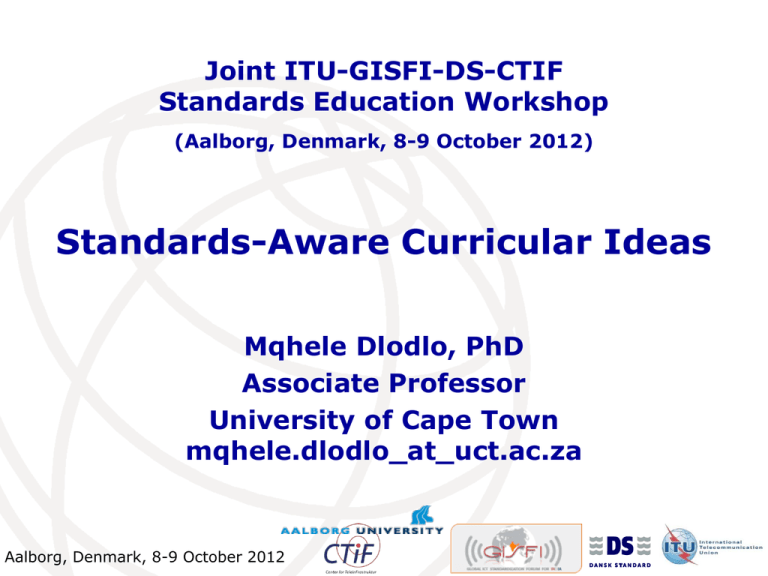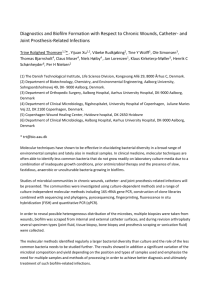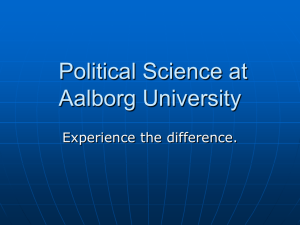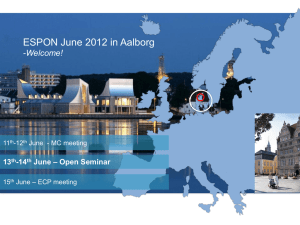Standards-Aware Curricular Ideas
advertisement

Joint ITU-GISFI-DS-CTIF Standards Education Workshop (Aalborg, Denmark, 8-9 October 2012) Standards-Aware Curricular Ideas Mqhele Dlodlo, PhD Associate Professor University of Cape Town mqhele.dlodlo_at_uct.ac.za Aalborg, Denmark, 8-9 October 2012 Argument Paradigm shifts reveal shortcomings in engineering curricula Revising the quantity of the technical content is continual Standards awareness is one such shortcoming UCT EBE is poised to tackle the curricular challenge Aalborg, Denmark, 8-9 October 2012 2 Nuanced, Dual-Model Paradigm Driven by economics of global More at: http://open-stand.org/ markets Improved interoperability Greater simplicity More competitive pricing UCT Internationalisation Paradigm: globally competitive, locally relevant Aalborg, Denmark, 8-9 October 2012 3 The IEA “Graduateness” Concept Individually assessable outcomes Indicators of potential to acquire competence to practise at the appropriate level Exemplars of attributes from an accredited programme Expected capability Range indication Source: www.washingtonaccord.org/IEA-Grad-Attr-ProfCompetencies-v2.pdf Aalborg, Denmark, 8-9 October 2012 4 Range Considerations Complex engineering activities: Use of diverse resources Resolution of significant problems interacting, wide-ranging, conflicting Creative use of engineering principles and research-based knowledge Significant consequences (difficult to predict/mitigate) – range of contexts Application of principles - new situations Aalborg, Denmark, 8-9 October 2012 5 Link to Standards-Awareness Improved interoperability Greater simplicity More competitive pricing globally competitive, locally relevant Aalborg, Denmark, 8-9 October 2012 6 Standards Teaching in Context What shall we call the new discipline? Science of standards? Isology? – Ken Krechmer, U of Colorado Knowledge, formally taught Scholarly journals, learned societies, academic departments/faculties Professional and personal attributes Aalborg, Denmark, 8-9 October 2012 7 Goals: Modelling Method To enable students to describe, explain, predict and control physical phenomena using scientific models To impart elementary conceptual tools for modelling physical objects and processes To illustrate selected elementary models as applications of “isology” To develop the insight as to how models fit into theories Aalborg, Denmark, 8-9 October 2012 8 Goals: Modelling Method To train students in validating scientific knowledge by correlating models to empirical data To develop comprehensively the skills of students in the modelling procedure for generating scientific knowledge To enable the students to solve constrained optimisation problems Aalborg, Denmark, 8-9 October 2012 9 HEQF: Bachelor’s Degree HEQF BSc/BEng NQF Exit Level: 8 Min Credits Total: 480 Min Level 8 Credits: 96 Min Level 7 Credits: 120 Max Level 5 Credits: 96 Aalborg, Denmark, 8-9 October 2012 EBE – BSc (Eng.) NQF Exit Level: 8 EBE Total: 576 Level 8 Credits: 144 Level 7 Credits: 144 Level 6 Credits: 144 Level 5 Credits: 144 10 ECSA Whole Qualification Standard Knowledge Area Minimum Credits % Allocation Mathematical Sciences 56 10 Basic Sciences 56 10 Engineering Sciences 168 30 Design & Synthesis 67 12 Computing and IT 17 3 Complementary Studies 56 10 Subtotal 420 75 Discretionary Studies ≥140 25 Total Credits ≥560 100 Aalborg, Denmark, 8-9 October 2012 11 EE One EE Two EE Three EE Four EE Degree Discretionary Complementary Studies Computing and IT Design and Synthesis Engineering Sciences Mathematics 576 credits Basic Sciences Table EE-1: Knowledge area summary for Electrical Engineering programme 32.0 32.0 46.4 32.2 43.2 4.8 57.0 11.8 9.6 11.0 8.0 0.0 0.0 0.0 0.0 4.4 71.2 33.2 3.6 19.6 12.0 0.0 0.0 61.2 18.0 0.0 28.8 36.0 48.0 64.0 79.0 232.6 69.8 26.2 56.4 56.0 56.0 168.0 67.2 16.8 56.0 140.0 2.6 9.4 Required 460 credits Var (+/-) 116 credits Aalborg, Denmark, 8-9 October 2012 8.0 23.0 64.6 0.4 12 Knowledge Area Plot for EE Prog. 250 200 EE 1 150 EE 2 EE 3 EE 4 EE Deg. 100 Required Var (+/-) 50 0 Math Sc Aalborg, Denmark, 8-9 October 2012 Eng Sc D&S C & IT CS Disc 13 ME One ME Two Discretionary Complementary Studies Computing and IT Design and Synthesis Engineering Sciences Mathematics 576 credits Basic Sciences Table ME-2: Knowledge area summary for Mechatronics programme 32.0 46.4 43.2 4.8 9.6 8.0 0.0 32.0 21.8 67.4 11.8 11.0 0.0 0.0 0.0 2.4 83.2 31.2 5.6 19.6 2.0 0.0 3.0 51.2 25.0 0.0 28.8 36.0 64.0 69.6 247.0 74.8 26.2 56.4 38.0 460 credits Var (+/-) 56.0 56.0 168.0 67.2 16.8 56.0 140.0 118 credits 8.0 7.6 9.4 ME Three ME Four ME Degree Required Aalborg, Denmark, 8-9 October 2012 13.6 79.0 0.4 14 Knowledge Area Plot for ME Prog. 300 250 200 ME 1 ME 2 ME 3 150 ME 4 ME Deg. Required 100 Var (+/-) 50 0 Math Sc Aalborg, Denmark, 8-9 October 2012 Eng Sc D&S C & IT CS Disc 15 ECE One ECE Two ECE Three ECE Four ECE Degree Discretionary Complementary Studies Computing and IT 32.0 32.0 0.0 0.0 43.8 10.2 3.6 0.0 11.1 31.0 30.2 30.0 19.8 21.4 29.0 2.0 8.0 0.0 19.6 28.8 -4.0 -4.0 10.0 22.0 64.0 57.2 197.9 104.3 72.2 56.4 24.0 460 credits Var (+/-) 56.0 56.0 168.0 67.2 16.8 56.0 140.0 132 credits 8.0 37.1 55.4 Required Aalborg, Denmark, 8-9 October 2012 1.2 33.3 53.4 51.6 61.2 Design and Synthesis Engineering Sciences Mathematics 576 credits Basic Sciences Table EC-1: Knowledge area summary for Electrical & Computer Engineering 29.9 0.4 16 ECE Prog. Knowledge Area Plot 250 200 150 ECE 1 ECE 2 ECE 3 100 ECE 4 ECE Deg. Required Var (+/-) 50 0 Math Sc Eng Sc D&S C & IT CS Disc -50 Aalborg, Denmark, 8-9 October 2012 17 Conclusions and Recommendations Standard Framework Standardisation CHE – NQF – HEQF ECSA Exit Level Outcomes Requirements IEA Guidelines Aalborg, Denmark, 8-9 October 2012 Rationale Winning some buy-in State Accreditation Professional Accreditation Competence within globally dispersed groups 18



